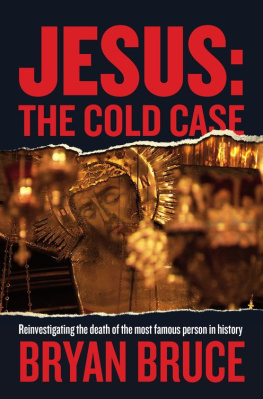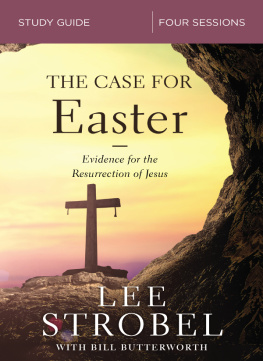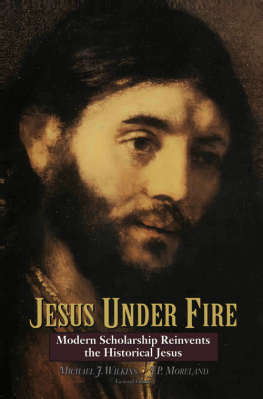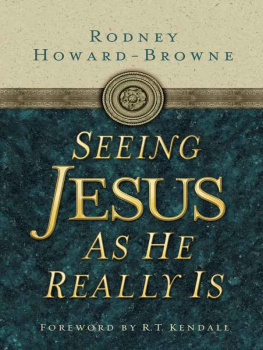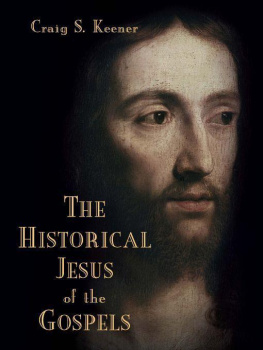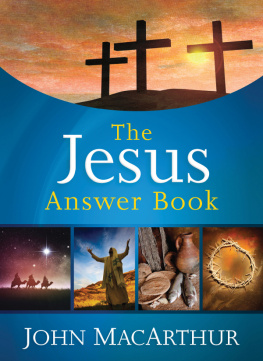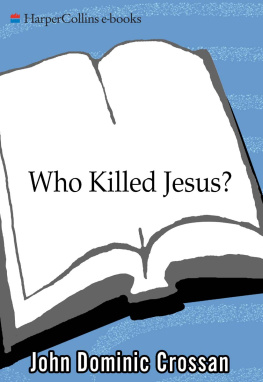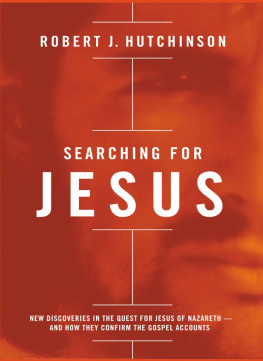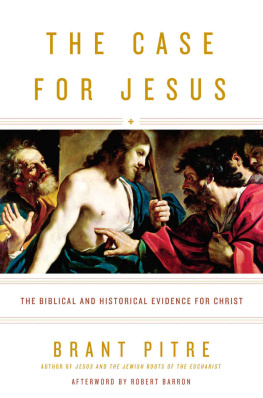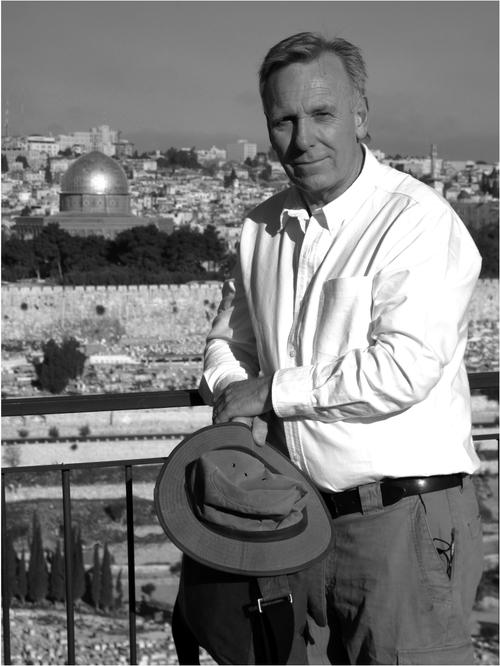Wellington-based Bryan Bruce is one of New Zealands most highly regarded documentary makers. Educated at Canterbury University, from which he has a Masters in Philosophy and Sociology, he has made over 30 documentaries and television series. He has won awards for Best Director (most recently the Qantas Award) and Best Writer. Over the years, his work has been selected for several international festivals, including the New York Television Festival, the Banff Awards and the French Jules Verne Awards. Jesus: The Cold Case is his third book. The documentary bearing the same name is based on its research.
In memory of Laure and Juliette Isaac, murdered at Auschwitz, 1943.
This book began with a simple idea. I would take the skills I had developed as a true crime investigator and apply them to what has to be the ultimate cold case the death of Jesus of Nazareth. After all, what more famous person has died in more mysterious circumstances than the man who many believe was the Son of God?
But as I write this introduction I find myself sitting in a train on my way to Warsaw, because my investigation has turned out to be not as straightforward as I had originally imagined, and because the story of who killed Jesus does not end in Jerusalem but in Auschwitz, Poland.
Why? Because in the course of my inquiries I came across a remarkable (but now somewhat neglected) book entitled Jesus andIsrael, written by the French philosopher Jules Isaac. The book was written during the Second World War, and completed after Isaacs wife Laure and his daughter Juliette were murdered in a Nazi death camp. It was through reading Isaacs poignant essay on Christian anti-Semitism that I realised I was not writing a simple whodunnit at all, but rather investigating a crime for which the Jewish people have paid a terrible price.
As a veteran investigator I was prepared for many things in the search for who killed Jesus: disappointment, false leads, blind alleys, exaggeration, charlatans and, in this particular case, statements of faith masquerading as historical fact.
What completely shook me was discovering how a Theology of Hate had been built from a Gospel of Love, and the discovery that the early Christians had told some bare-faced lies about who was responsible for the death of Jesus. Lies that are repeated throughout the Christian world every Easter.
Bryan Bruce
Warsaw
2009
Jules Isaac called it a Theology of Contempt, but he was more polite than I.
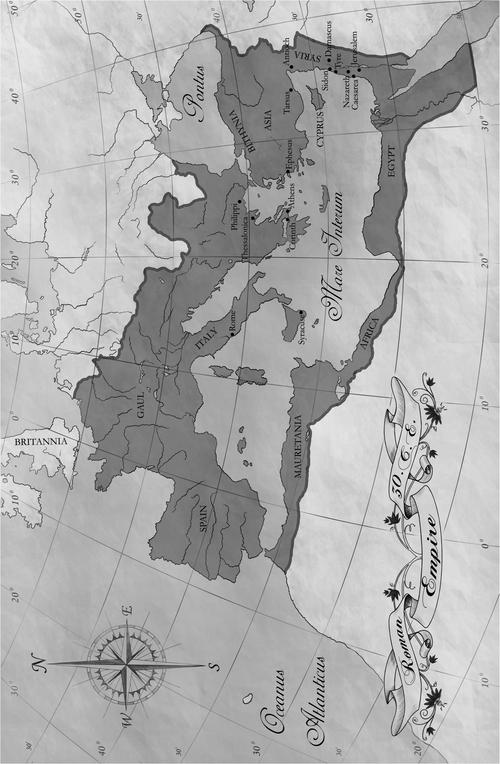
ABOVE: Map of the Roman Empire (ca 30 CE)
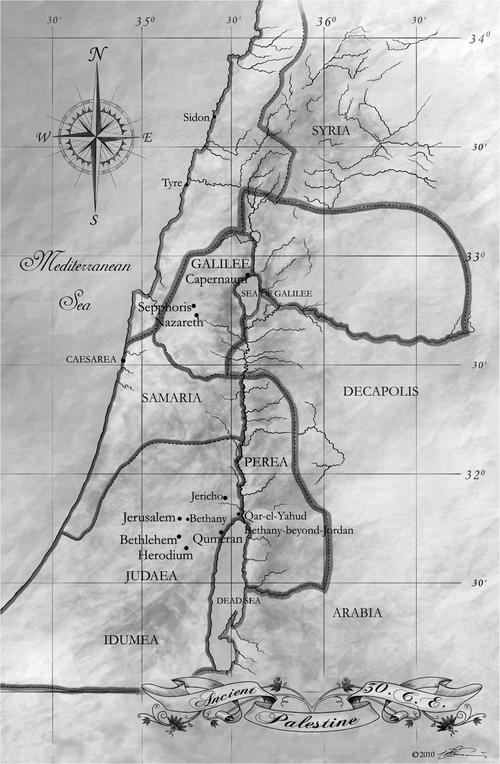
ABOVE: Map of ancient Palestine (ca 30CE)
BEFORE THE COMMON ERA (BCE)
(? indicates an approximation where the data is insufficient or inconclusive)
| 19001700? | Abraham arrives in Palestine; Isaac born to Abraham; Jacob subsequently born to Isaac. Jacob said to have had 12 sons, who become the ancestors of the 12 tribes of Israel, the most prominent of whom is Joseph, who becomes an adviser to the King of Egypt |
| 17001290? | The descendants of Jacob are enslaved in Egypt |
| 1290? | Moses leads the Israelites out of Egypt and receives the Law from God on Mount Sinai |
| 1250? | Joshua leads the first stage of the invasion of Canaan |
| 10301010 | King Saul reigns over Israel |
| 1008970 | David succeeds Saul as King |
| 1000 | David conquers Jerusalem and makes it the capital of his kingdom, the City of David and the religious centre of his people |
| 970931 | Davids son Solomon succeeds him as king, and builds the First Temple in Jerusalem. On his death the kingdom divides into north (Israel) and south (Judaea or Judah) |
| 722 | After a long campaign, Assyrias conquest of Israel is completed; the population is deported; the prophet Isaiah is active in Jerusalem |
| 586 | Babylon conquers Jerusalem, destroys the Temple, and deports large numbers of the population to work as slaves; the prophets Jeremiah and Ezekiel are active |
| 532 | Persia conquers Babylon; the exiles are permitted to return and build the Second Temple |
| 332 | Alexander the Great conquers Judaea; the Hellenistic era begins |
| 323 | Alexander dies; the Ptolemies of Egypt and the Seleucids of Syria rule Judaea by turns for the next 150 years |
| 167 | Judas Maccabeus leads the Jewish revolt against the Seleucid ruler Antiochus IV (Antiochus Epiphanes), who as King of Syria occupied Jerusalem and introduced pagan rites at the Jewish Temple |
| 164 | The Second Temple is rededicated; the festival of Hanukkah is introduced in celebration |
| 141 | The priestly Hasmonean family is established as the ruling dynasty of an independent Jewish kingdom; origins of the Dead Sea Scroll community |
| 63 | The Roman general Pompey captures Jerusalem and penetrates the Temple; the Hasmoneans now rule as client kings of Rome |
| 44 | Julius Caesar is murdered; the passing of a comet is said to reveal his divinity |
| 40 | Herod the Great is appointed King of Judaea by the Roman Senate |
| 37 | Herod takes control of Jerusalem and expands the Second Temple on a magnificent scale |
| 27 | Caesar Augustus becomes the first Roman Emperor |
| ca 4 | Birth of Jesus, according to the Gospel of Matthew |
| 4 | Herod dies; his kingdom is divided between his sons Archelaus (Judaea), Antipas (Galilee and Perea), and Philip (Transjordan) |
COMMON ERA (CE)
| 6 | Augustus deposes Archelaus. Judaea becomes a second-grade province under a Prefect (colonial Governor), subordinate in turn to the provincial legate of Syria. The new administration instigates a census for tax purposes, which triggers a revolt led by Judah the Galilean |
| 615 | Annas is High Priest in Jerusalem |
| 10 | Rabbi Hillel dies; his followers become the leaders of Pharisaic Judaism |
| 14 | Augustus dies; his stepson Tiberius becomes Emperor |
| 1836 | Caiaphas, Annas son-in-law, is High Priest |
| 2636 | Pontius Pilate is Prefect of Judaea |
| 28 | Jesus is baptised by John; John is beheaded by Antipas; Jesuss mission begins |
| 30 | Jesus is crucified by Pontius Pilate, possibly during Passover |
| 33 | Saul of Tarsus experiences a vision on the road to Damascus; he changes his name to Paul and joins the Christian movement |
| 36 | Pilate is dismissed as Prefect following the incident with the Samaritan prophet; Caiaphas is deposed as High Priest |
| 37 | Stephen, regarded as the first Christian martyr, is stoned to death by order of the Sanhedrin, the Jewish council |
| 39 | Antipas is deposed as ruler of Galilee; an anti-Jewish outbreak occurs in Alexandria; the Emperor Caligula attempts to place his own statue in the Temple in Jerusalem; there is a massive protest strike in Galilee and Judaea |

